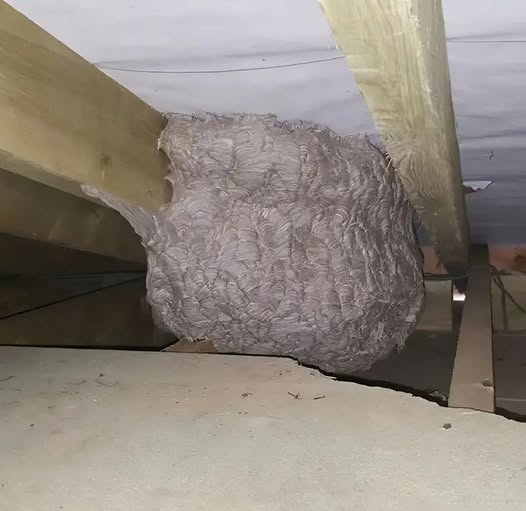In the peaceful countryside of Finistère, Brittany, a story unfolded that began with worry but ended with innovation and hope. What started as a routine check in an attic led one man to create a groundbreaking solution that is now helping protect bees around the world.
A Life Dedicated to Nature
Denis Jaffré, a former sailor who settled into a quiet life as a beekeeper, had found joy in caring for his hives and working closely with nature. Surrounded by the soft hum of bees and the scent of wildflowers, he believed he had found peace. But in 2017, that peace was shattered by an unexpected enemy — the Asian hornet.
These hornets are one of the most aggressive threats to bees in Europe. Within just a few months, they had destroyed half of Denis’s hives. For him, this loss was not just financial but deeply emotional. “You care for them, you watch them build, and then overnight, everything is gone,” he shared.
Instead of giving up, Denis decided to fight back — not with chemicals or destruction, but with creativity and respect for nature.
Turning a Problem into a Purpose
Inside his small garage, Denis began experimenting with different ideas. He used recycled materials, jars, nets, and wood scraps to build traps that could stop hornets without harming bees. Many early attempts failed, but Denis refused to quit. After months of testing, he finally created a design that worked.
His trap used a natural bait to attract hornets into a chamber fitted with narrow openings — large enough for hornets to enter, but too small for bees or butterflies. Once inside, the hornets couldn’t escape, while other pollinators remained safe.
The result was simple, sustainable, and highly effective.
Recognition and Innovation
By 2019, Denis’s invention was awarded a medal at the Lépine Competition, one of France’s oldest and most prestigious innovation fairs. What began as one man’s experiment soon became a recognized environmental breakthrough.
In 2021, Denis founded Jabeprode, a small company dedicated to producing eco-friendly hornet traps. From his workshop in Bodilis, northern Brittany, he and his small team of seven employees handcraft each trap with care. What started in his attic had become a thriving, environmentally conscious business with a global impact.
“We’re not just making a product,” Denis explained. “We’re protecting life.”
Expanding Across Europe and Beyond
Within a few short years, Denis’s traps were being used in 18 European countries, including France, Spain, Italy, Germany, and Belgium. As sightings of Asian hornets began to appear in North America, interest grew in the United States as well.
Experts praised the design for its balance of efficiency and ethics — eliminating invasive hornets without harming the biodiversity that pollinators depend on. Denis’s invention became a model for sustainable environmental solutions.
A Mission Rooted in Responsibility
For Denis, success was never just about profit. His deeper mission is education. He works tirelessly to raise awareness about eco-friendly hornet control, urging communities to avoid toxic chemicals that harm the environment. He also supports research into natural pest management and sustainable pollination practices.
In his words, “We can’t fight one problem by creating another. True innovation should help nature, not harm it.”
Empowering Communities
Denis’s message has inspired people far beyond Brittany. Beekeepers, farmers, and even home gardeners now use his traps as part of a broader movement to protect pollinators. Environmental groups credit his design with saving thousands of hives, reducing honey shortages, and strengthening local ecosystems.
He has also launched a crowdfunding campaign to expand his production facility and support ongoing research into pollinator protection technologies. His vision is simple yet powerful: to make every person feel they can contribute to protecting nature.
“Every trap placed in a garden or near a hive makes a difference,” he says. “Every small action counts.”
From Personal Loss to Global Hope
Though he has gained recognition across Europe, Denis remains humble. To him, his success is measured not in awards, but in the steady hum of bees returning to their hives. “Bees teach patience,” he says. “They show that survival depends on working together.”
What once seemed like a disaster — an attic full of hornets — became the beginning of something extraordinary. Through determination and compassion, Denis turned fear into innovation, transforming a local problem into a global solution for environmental balance.
Today, his traps are helping protect thousands of bee colonies across continents. His work reminds us that meaningful change often begins in the most unexpected places — with one person choosing creativity over despair.
A Legacy of Sustainability
Denis Jaffré’s story is more than a tale of invention; it’s a lesson in resilience and respect for nature. His dedication to protecting pollinators stands as proof that even in a world facing environmental challenges, individuals can make a real difference.
In a time when ecosystems are under threat, Denis’s quiet determination echoes a message of hope: that sustainable solutions, built with care and respect, can restore harmony between people and the planet.
Because in the end, it’s not the noise of machines or the chaos of modern life that defines progress — it’s the gentle, persistent hum of bees, carrying the sound of renewal and the promise of a thriving future.
